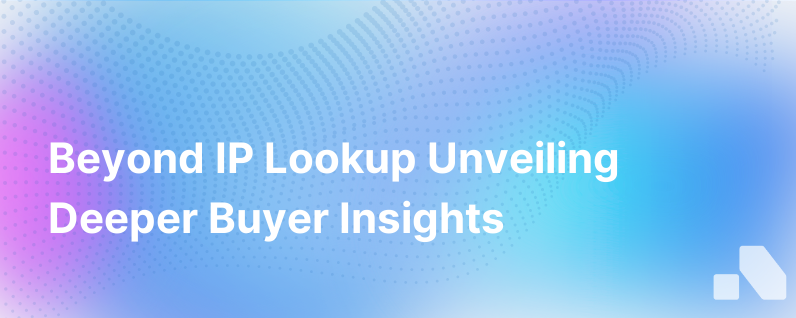Ip Lookup Only Scratches The Surface Of Buyer Data
Published on November 30, 2023 by David Zhang
In the modern B2B sales landscape, IP lookup technology is often lauded as a cornerstone for uncovering buyer data. It can reveal the digital fingerprints of a potential customer visiting your site, providing key insights into which organizations are showing interest in your product or service. However, when it comes to truly understanding and engaging your buyers, relying solely on IP lookup is akin to skimming a book and claiming to comprehend its depth—it only scratches the surface.
Data-driven sales strategies are now the backbone of effective selling, and the potential hidden within layers of buyer data remains largely untapped by IP lookup. This article explores the limitations of IP lookup and delves into how modern B2B sales teams can deepen their insights to cultivate more personalized, strategic, and ultimately successful sales efforts.
The Limitations of IP Lookup
IP lookup can potentially reveal an organization’s domain name, industry, employee size, and location. While this information serves as a groundwork for lead generation, it is rudimentary and does not provide the granular insights needed for targeted sales strategies.
1. Surface-Level Insights: IP lookup primarily identifies the "where," not the "who" or the "why." Understanding that someone from a large financial institution visited your site is helpful, but without context, such as which department or decision-maker is showing interest, your sales team can't act optimally on this information.
2. Variable Accuracy: Dynamic IP addresses and the widespread use of VPNs can skew the accuracy of IP lookup data. Furthermore, IP addresses can sometimes be associated with network providers or third-party locations, leading to false positives.
3. Lack of Behavioral Data: Pure IP lookup data doesn’t capture user behavior—what pages were visited, time spent on each page, or specific content downloaded. Without this level of detail, sales teams miss out on critical insights that could inform the sales strategy.
4. The GDPR Impact: Regulations like GDPR can further limit the utility of IP data, categorizing it as personal data that requires consent. This regulatory tape reduces the volume and scope of the data that can be collected, requiring businesses to navigate privacy concerns systematically.
Going Beyond IP Lookup: Exploring Deeper Data
Moving beyond IP lookup involves embracing a suite of tools and methodologies designed to understand and predict the complex tapestry of modern buying behavior.
1. Layering Data Sources: By combining IP lookup with other data sources such as firmographics, technographics, intent data, and predictive analytics, sales teams can build comprehensive buyer profiles. These profiles are then used to shape personalized engagement strategies based on a prospect's likely business needs, technology stack, and readiness to buy.
2. Employing Lead Scoring Systems: Sophisticated lead scoring models go beyond basic company information to predict the likelihood of a prospect converting, prioritizing leads by incorporating behavior over time and its alignment with defined buyer personas.
3. Incorporating AI and Machine Learning: AI-driven platforms can track, analyze, and learn from nuanced buyer data, including content engagement and buyer intent signals, to refine predictions about a prospect's location in the buying cycle and to inform timely sales interventions.
4. Integrating CRM and Marketing Automation: Sales teams increasingly rely on the seamless integration of CRM and marketing automation systems, where buyer interactions with emails, webinars, and whitepapers contribute to a cumulative record of interest and fit.
5. Engaging in Social Listening: Utilizing advanced social media monitoring tools can provide a different viewpoint into buyer concerns, preferences, and needs, granting additional context to the information obtained through IP lookup.
The Power of Actionable Intelligence
Gathering data is only half the battle. The real value lies in actionable intelligence—data that informs a specific course of action. Actionable intelligence allows:
-
Timely and Relevant Communication: Understanding the buyer's pain points, preferred solutions, and urgency enables salespeople to reach out with the right message at the right time, elevating chances of conversion.
-
Predictive Personalization: When a salesperson knows the buyer’s business needs and challenges, they can personalize the sales conversation, positioning the product to meet those needs explicitly.
-
Strategic Account Planning: Deeper intelligence facilitates the transformation of raw data into strategic account plans, anticipating future needs, and identifying potential upsell and cross-sell opportunities.
The Role of Platforms like Aomni
Tools like Aomni can help convert the extensive sea of data into useful insights for your sales team. By consolidating and refining complex buyer data into real-time, actionable intelligence, Aomni helps transform IP lookup from a blunt instrument into a component of a nuanced sales symphony. Here, AI does the heavy lifting, sifting through layers of data to supply sales teams with up-to-date account research, actionable competitive insights, and personalized sales content in as little as 15 minutes—without an ounce of extra effort.
Conclusion
While IP lookup remains a valuable starting point, it's clear that to run a race in today's B2B sales arena, deeper strides into the realm of buyer data are required. By combining this initial touchpoint with a richer dataset, sales teams can engage with prospects with unprecedented precision, driving sales strategies that are both informed and refined. As technology continues to advance, tools like Aomni are indicative of a broader trend where data isn't just about quantity, but the quality of insight it yields.